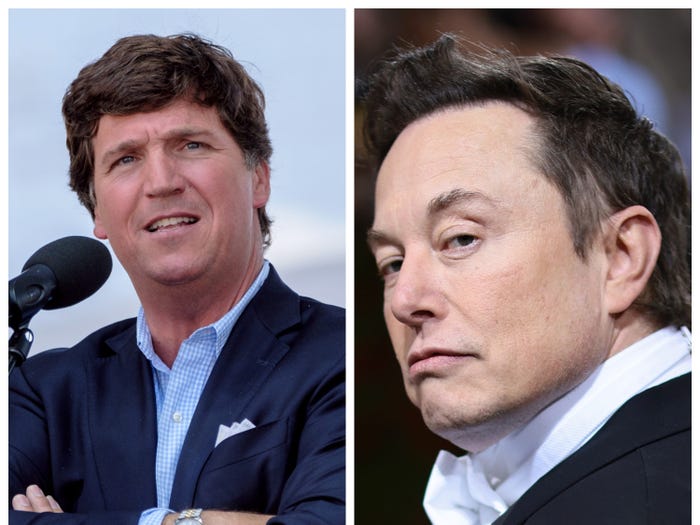Tucker Carlson’s first Twitter show went big on UFOs and Ukraine war conspiracy theories. Musk must know that spells disaster.

- Tucker Carlson’s Twitter show finally made its debut. Advertisers and users should be concerned.
- His monologue hinted at how Twitter is fast becoming a place that will cater to extreme views.
- This may be problematic for Elon Musk if advertisers and users find the content crosses a line.
The first episode of Tucker Carlson’s Twitter show is finally here and it’s exactly as you’d expect it to be: a meandering, uninterrupted monologue on Ukraine war conspiracies, 9/11, and UFOs.
The former Fox News host launched the first episode of his new show called “Tucker on Twitter” on Tuesday, and at the time of writing, had gained around 50 million views since releasing the roughly 10-minute video to the platform.
Carlson speculated on the possibility that Ukraine blew up the Kakhovka Dam, which sparked floods this week (it is not yet clear who caused this), claimed the media wasn’t interested in 9/11 or Jeffrey Epstein, and talked at length about a whistleblower’s claim that the US is hiding an intact alien vehicle.
“Your average Yak herder in Tajikistan knows who blew up the Nordstream Pipeline. It’s obvious. Does he think some skinny dude in a dress is actually a girl?” Carlson said.
“Come on. That idea would never occur to him. You’ve got to be lied to at full volume over a period of years in order to reach conclusions like that. And, of course, we have been.”
It comes less than a month after the controversial anchor announced his decision to jump ship to Twitter after suggesting that its ownership under Elon Musk made it the last big platform to allow free speech. “At the most basic level, the news you consume is a lie,” Carlson said at the time.
Carlson’s debut will do little to dispel the sense that Twitter under Elon Musk has become a merry-go-round of conspiracies and extreme speech.
Democrat Rep. Ritchie Torres tweeted that Carlson showed himself to be “even more nakedly a conspiracy theorist and pro-Putin propagandist” on Twitter than his “Fox News incarnation.”
Pekka Kallioniemi, a researcher and expert in interactive technology and social media, responded by tweeting that Carlson is “a greedy opportunity who has no interest in the truth,” as he pushed “conspiracy theories and pro-Kremlin BS.”
The Atlantic’s Anne Applebaum, meanwhile, tweeted that “Carlson’s lies” cost Fox $800 million, alluding to the market value Fox lost after parting ways with Carlson while noting that “he is still lying, and Twitter will eventually pay the price too.”
It’s not just users who are unhappy. The challenge with keeping advertisers onboard is proving to be a persistent one too.
Over the five-week period from April 1 to May, Twitter’s ad revenue was $88 million, down by a staggering 59% from the same period the previous year, per an internal presentation seen by The New York Times.
Current and former Twitter employees told the paper that the ad sales team at the company couldn’t see those fortunes being reversed anytime soon over concerns that a rise in hate speech could be an advertiser deterrent.
That’s despite Musk suggesting to the BBC that advertisers were returning. Insider reported last month that Twitter is putting its ad inventory on sale by allowing other adtech companies to sell its ads for it.
Allowing Carlson to run wild in future episodes the way he did on Tuesday seems likely to turn Twitter into an increasingly polarized platform driven by hate speech, though Musk himself seems quietly aware of the risk of Carlson being left to run wild.
He tweeted that Twitter’s Community Notes and user comments would “be great for correcting or adding context.”
Musk also tweeted Carlson’s first episode not with a congratulatory note, but instead by extending an invitation to others to launch their own programs. “Would be great to have shows from all parts of the political spectrum on this platform!” he said.
Much of this challenge could fall into the lap of Twitter’s new CEO Linda Yaccarino, the former NBC ad executive who will be tasked with making the service as attractive as possible to advertisers in her extensive black book of industry contacts.
There is a degree of urgency to this. Musk’s $44 billion takeover of Twitter last year was a debt-fueled one that carries the burden of costly interest repayments on loans worth $13 billion. Twitter will need advertisers and users more than ever.
.content-lock-lock .hidden { display: none; }
This article has been archived for your research. The original version from Business Insider can be found here.


